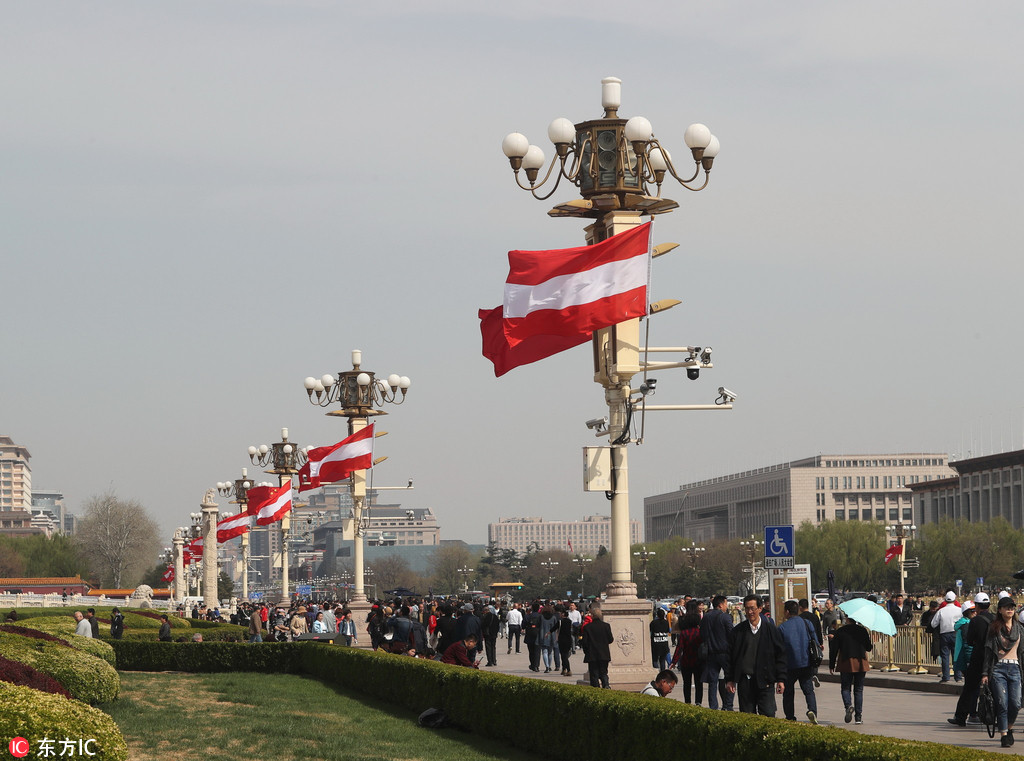Trade links strengthen on exports
By Zhong Nan | China Daily | Updated: 2018-04-10 09:50

Ties with wider Europe set to deepen thanks to Belt and Road Initiative boost
China and Austria will continue to diversify economic cooperation and build stronger trade ties in 2018, as their products are complementary and they have already agreed to develop the Belt and Road Initiative and the Central and Eastern European market, officials said.
"The enhanced trade ties between China and Austria will bring about a win-win situation as China has a profound market for imports from Austria, which can pull up local employment," said Sang Baichuan, director of the Institute of International Business at the University of International Business and Economics in Beijing.
He said both countries have more space to expand trade and investment, and to deepen cooperation in such fields as advanced manufacturing, modern services, environmental protection and urbanization this year.
The trade volume between China and Austria jumped 15.5 percent year-on-year to $8.39 billion in 2017, data from the Ministry of Commerce show.
China exports mainly construction machinery, computers, transport equipment, chemical products, raw materials, electronics, textiles, garments and household appliances to Austria.
Austrian shipments to China are largely auto and machinery parts, food and agricultural products, raw materials, integrated circuits, pharmaceuticals and steel products.
Austria's strategic location at the center of Europe, innovation-based economic development model and supportive policies to develop markets related to the Belt and Road Initiative can certainly be used as a basis for cooperation with China, said Friedrich Stift, the Austrian ambassador to China.
Eager to further promote free trade and accelerate investment inflows via a wider platform, in 2013 China proposed the Silk Road Economic Belt and the 21st Century Maritime Silk Road to build infrastructure, service and trade networks connecting more than 60 countries and regions in Asia, Europe and Africa.
Known as the Belt and Road Initiative, it aspires to improve the lives of around 4.4 billion people, or 63 percent of the world's population.
The initiative has gained support from over 100 economies and international organizations, with nearly 50 cooperation agreements signed between governments since 2013.
"Austria can provide expertise via intelligent infrastructure solutions to the implementation of the initiative, such as in transport, logistics, green technologies and energy solutions," said Gu Xuebin, vice-president of the Beijing-based Chinese Academy of International Trade and Economic Cooperation.
He said numerous Austrian technologies can be exported to China, from automation, nanotechnology, robotics, green technology and aspects of healthcare such as nursing, to more specifically local industries such as wood and cable cars, as well as other winter sports equipment ahead of the 2022 Winter Olympics in Beijing.
Backed by strong business and political ties, China had signed 2,183 technology import contracts with Austria with a total contract value of $6.08 billion by the end of 2017, data from the Ministry of Commerce show.
Zhang Wei, vice-chairman of the China Council for the Promotion of International Trade, said many countries related to the Silk Road Economic Belt have relatively poor infrastructure and thus have the need for improved railway, airport and harbor systems.
"Both China and Europe should work together here to stabilize this corridor, which would also allow the specific countries in question to profit from improved infrastructure, leading to a better overall business environment and increased prosperity for people living there," he said.
Austria has close ties with CEE countries and has developed networks with strong contacts and available business opportunities in these countries, Zhang said, adding Austrian businesses have also been leading investors in CEE countries, and have established market networks there.
Official data show Chinese companies invested a total of $850 million in Austria by the end of 2017, while foreign direct investment made by Austrian businesses in China amounted to $1.99 billion.
























